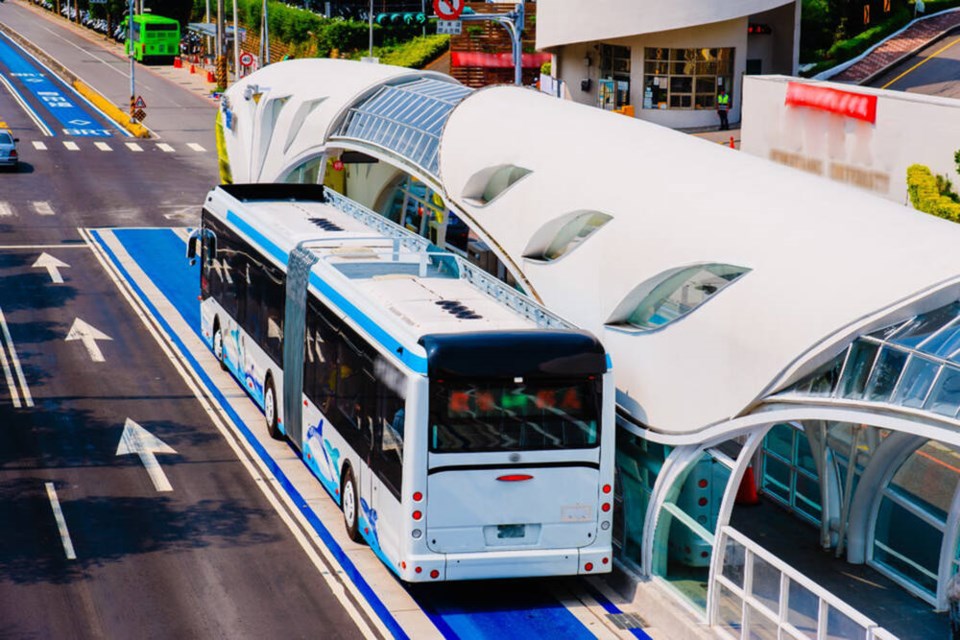The BC NDP is promising to fully fund a bus rapid transit line from Park Royal to Metrotown, if elected.
North Vancouver-Lonsdale NDP incumbent Bowinn Ma made the announcement alongside her fellow North Shore candidates Susie Chant and Sara Eftekhar on Tuesday morning.
Such a transit line was identified as a priority by the TransLink Mayors’ Council in 2022, but currently it does not have the funding needed to start construction in 2025.
Ma said the NDP would be prepared to spend the estimated $500 million required for the bus rapid transit line, which she said should rival the capacity, speed, reliability the efficiency of an LRT line but at a fraction of the cost.
“The public transit system is incredibly important to us here, but it does not currently deliver the level of reliability and consistency that a lot of people require in order to make the choice to get onto public transit and leave their cars at home,” she said. “That lack of options is incredibly challenging for people. Well, it’s high time for that to change.”
Before construction of that system is complete, Ma said an NDP government would extend the current R2 RapidBus from Phibbs Exchange to Metrotown, giving commuters an express connection to the SkyTrain system. And she added the government will continue the work already begun on planning an eventual fixed-link rapid transit system across Burrard Inlet and replacement of the Ironworkers Memorial Second Narrows Crossing.
The NDP’s announcement came on the same day as a TransLink Mayors' Council press conference in North Vancouver “sounding the alarm” about impending cuts to transit.
City of North Vancouver Mayor Linda Buchanan said the NDP’s announcement for bus rapid transit was “welcome,” but she quickly added a caveat.
“The fact remains, TransLink is facing a $600 million per year structural deficit, and no new funding has been committed by the provincial government after 2025,” she said.
District of North Vancouver Mayor Mike Little said the amount of revenue TransLink gets from the regional gas tax has been dropping as consumers transition toward electric vehicles. And despite ridership increasing since the pandemic, fare revenues are still less than they were.
Without more reliable sources of funding for the transit system, the mayors raised the spectre of reducing bus frequency to every 30 minutes or cutting off service entirely after 8 p.m. If those cuts were to happen across the region, it would result in a 20-per-cent increase in vehicle traffic, the Mayors’ Council estimates.
“I want to be clear, this is not a stunt. This is fact. This is real. Anyone living on the North Shore knows traffic congestion has reached a tipping point,” Buchanan said.
In response, Ma said hers was the first provincial government to get involved in directly funding TransLink when the pandemic wiped out ridership and revenues.
“The BC NDP has always been there for public transit,” she said. “We’ll be sitting down with them and I’m confident we’ll be able to make it work.”
In response, North Vancouver-Lonsdale BC Conservative Candidate David Splett said his party’s platform including transportation policies won’t be released for another week. However, he added he was personally skeptical given the NDP could have funded the project in the last term.
“The plan… has been in place for many years, and yet the NDP have done nothing,” he said.
In July, the Conservatives put out a press release in July blaming TransLink’s financial shortfalls on the NDP. In that release, Conservative leader John Rustad said his plan to “rescue TransLink” includes an accountability audit for the transit authority, and two years of stop-gap funding to develop a “Back-on-Track Plan,” leading to a non-specified “sustainable funding model addressing financial mismanagement, overcrowding, and capacity issues.” The plan also includes a pledge to expedite the new Surrey-Langley SkyTrain line and to ensure B.C. gets its share of federal transit funding dollars.
Little said the mayors will by looking for more details, before Metro Vancouver commuters and property owners face severe impacts.
“We don’t want to be there. That’s why we’re out here talking about it. Those are the tools that are available to us. Either dramatically raising the fare box and dramatically raising the property taxes, or reviewing service cut potentials,” he said. “Our communities understand the urgency. Now, the parties need to listen.”




